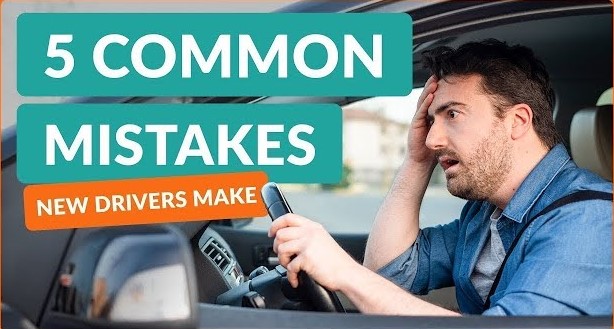What are the Mistakes New Drivers Make and How to Avoid Them?
Discover common mistakes new drivers make and learn effective tips to avoid them for a safer, more confident driving experience.

Learning how to drive is a major milestone in life, offering newfound independence and freedom. However, new drivers often face challenges on the road, especially when it comes to avoiding common mistakes. Understanding these mistakes and how to avoid them is crucial for staying safe and building confidence behind the wheel. In this post, we’ll explore the top mistakes new drivers make and provide tips on how to avoid them.
1. Overconfidence Behind the Wheel
One of the most dangerous mistakes new drivers make is becoming too confident too quickly. After a few successful trips, it’s easy to feel like you’ve mastered driving. This overconfidence can lead to risky decisions, such as speeding, aggressive lane changes, or ignoring safety measures.
How to Avoid It: Always remind yourself that driving requires constant focus and caution. Respect the learning process and take your time to fully develop your skills. Avoid showing off or taking unnecessary risks, especially in high-traffic areas or unfamiliar roads.
2. Failing to Check Blind Spots
Blind spots are areas around your car that aren’t visible through your mirrors, and failing to check them before changing lanes or merging can lead to accidents. This is a common mistake for new drivers, who might rely too heavily on their mirrors without physically turning to check for other vehicles.
How to Avoid It: Always do a quick shoulder check before making any lane changes or turns. Practice this habit even when the road seems clear. Using technology like blind-spot monitoring systems is helpful, but they should never replace manual checks.
3. Speeding and Misjudging Speed Limits
Many new drivers struggle with controlling their speed. Some drive too fast, eager to keep up with traffic, while others may drive too slowly out of caution, causing issues for other drivers. Misjudging speed limits, especially in residential areas or school zones, can also lead to dangerous situations.
How to Avoid It: Familiarize yourself with speed limits and adjust your speed according to the conditions of the road. Use speed signs as a guide, and remember that slower does not always mean safer, especially on highways.
4. Distracted Driving: Using Phones and Other Gadgets
Distracted driving is one of the leading causes of accidents, and new drivers are especially vulnerable. Whether it’s texting, changing the music, or using GPS, taking your eyes off the road for even a second can have serious consequences.
How to Avoid It: Put your phone away or use a hands-free setup. Set up your GPS or music before you start driving, and avoid multitasking while on the road. If something demands your attention, pull over safely before dealing with it.
5. Poor Merging Techniques
Merging onto highways or busy roads can be intimidating for new drivers. Many beginners either hesitate too much, which can disrupt the flow of traffic, or merge too aggressively without properly judging the speed of oncoming vehicles.
How to Avoid It: Practice merging in less congested areas to get a feel for how to smoothly enter traffic. Use your mirrors and always signal before merging. Timing is key—wait for a safe gap and accelerate smoothly to match the speed of the cars in the lane.
6. Hard Braking and Accelerating
New drivers often have trouble with smooth braking and acceleration, leading to jerky stops and starts. This can be dangerous, especially in heavy traffic, and may make other drivers nervous.
How to Avoid It: Practice gentle braking and accelerating in open spaces before hitting the road. Anticipate stops and starts by watching the traffic ahead. Gradually apply pressure to the pedals instead of using sudden force.
7. Not Using Turn Signals
Forgetting to use turn signals is another common mistake among new drivers. This can confuse other drivers and lead to collisions, especially at intersections or during lane changes.
How to Avoid It: Make signaling a habit. Even if you don’t see any other vehicles nearby, always use your turn signal when changing lanes or making turns. It’s a simple but critical communication tool on the road.
8. Ignoring Road Signs and Traffic Rules
It’s easy to overlook road signs or misinterpret traffic rules when you’re focused on the basics of driving. New drivers often miss important signs like speed limits, yield signs, or no-parking zones, which can result in fines or accidents.
How to Avoid It: Stay vigilant and familiarize yourself with common road signs and their meanings. If you’re unsure of a rule or sign, take the time to look it up. It’s better to be cautious and informed than risk breaking the law or causing an accident.
9. Poor Parking Skills
Parking, especially parallel parking, can be tricky for new drivers. Many beginners struggle with estimating the space required or positioning their vehicles correctly in parking spots, leading to minor scrapes or failed parking attempts.
How to Avoid It: Practice parking in a variety of situations—parallel, reverse, and angle parking—so that you’re comfortable with different parking scenarios. Use your mirrors and sensors (if available), and don’t rush the process. It’s okay to make adjustments until you’re properly parked.
10. Not Maintaining a Safe Following Distance
Tailgating, or following too closely behind another vehicle, is a common mistake that leaves little room for error. If the vehicle in front stops suddenly, there’s a high chance of a rear-end collision.
How to Avoid It: Maintain a safe distance by following the “three-second rule.” Choose a fixed point on the road, and when the vehicle in front passes it, count to three. If you reach that point before finishing the count, you’re too close and need to slow down.
Conclusion
Driving is a skill that takes time to master, and making mistakes is part of the learning process. However, being aware of the common errors new drivers make can help you avoid them and become a more responsible and confident driver. By practicing safe driving habits, staying alert, and respecting the rules of the road, you’ll be well on your way to a successful driving experience. Read the full article on Letsdiskuss.com
What's Your Reaction?














